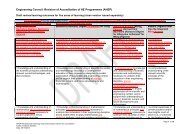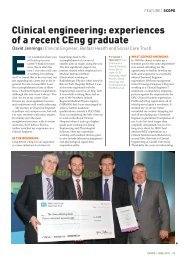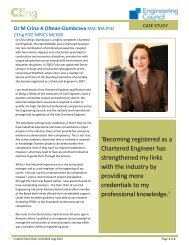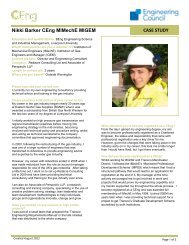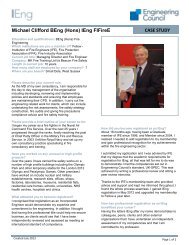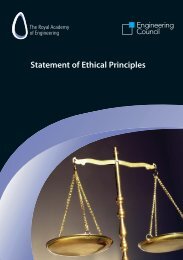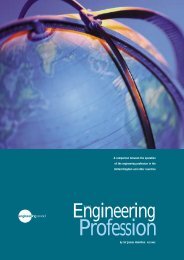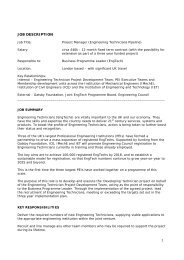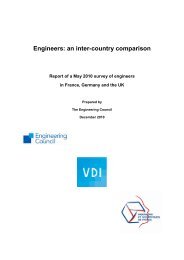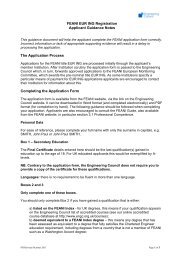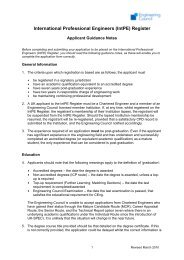An Engine for Change - A Chronicle of the Engineering Council
An Engine for Change - A Chronicle of the Engineering Council
An Engine for Change - A Chronicle of the Engineering Council
You also want an ePaper? Increase the reach of your titles
YUMPU automatically turns print PDFs into web optimized ePapers that Google loves.
186A CHRONICLE OF THE ENGINEERING COUNCILWithin each category <strong>the</strong> items are listed in no special order. They should be read in <strong>the</strong>context <strong>of</strong> <strong>the</strong> <strong>Engine</strong>ering <strong>Council</strong> being established as a Chartered body ra<strong>the</strong>r than <strong>the</strong>Statutory Authority recommended by Finniston which, indeed, would have been preferred bymany, though not all, <strong>of</strong> <strong>the</strong> subsequent participants in <strong>the</strong> EngC’s affairs. More detailedviews on various aspects will be found in <strong>An</strong>nexes H and I.Successes• The encouragement <strong>of</strong> women into engineering through WISE backed by mediacampaigns.• The creation and implementation <strong>of</strong> Standards <strong>An</strong>d Routes to Registration (SARTOR-1 and 2).• Raised pr<strong>of</strong>essional standards exemplified by <strong>the</strong> ‘Competence and Commitment’document and <strong>the</strong> subsequent SARTOR-3.• Establishment <strong>of</strong> Industry Affiliates.• Nomination and audit <strong>of</strong> Institutions’ policies and procedures.• Regular surveys <strong>of</strong> <strong>the</strong> pr<strong>of</strong>ession.• Young <strong>Engine</strong>er(s) <strong>for</strong> Britain (YEB) – a high pr<strong>of</strong>ile nationally and in <strong>the</strong> regions.• Considerable media successes such as <strong>the</strong> publication <strong>of</strong> new Registrants’ names in<strong>the</strong> Daily Telegraph and The Times.• Certain EngC reports on national issues such as those on ‘Risk’, ‘Environment’ and‘Trading up your Technology’.• The ‘Washington Accord’ on international recognition <strong>of</strong> accredited degrees.• Take over and management <strong>of</strong> <strong>the</strong> Register <strong>of</strong> CEngs, IEngs and EngTechs.• Neighbourhood <strong>Engine</strong>ers.• The “Ivanhoe” booklets on <strong>the</strong> engineering pr<strong>of</strong>ession.• The EC Regional Organisation, until replaced by <strong>the</strong> PEIs .Partial Successes• EngC Examinations – a good ef<strong>for</strong>t but could have been fur<strong>the</strong>r developed.• The introduction <strong>of</strong> Continuing Pr<strong>of</strong>essional Development (CPD).• Relations with Europe and FEANI.• Some (but not enough) mergers <strong>of</strong> Institutions.• Clear and inspiring goal and strategy.• Better working relationships with and between <strong>the</strong> Institutions.• Encouragement <strong>of</strong> greater recognition <strong>of</strong> Incorporated <strong>Engine</strong>ers and <strong>Engine</strong>eringTechnicians.• The publication <strong>Engine</strong>ering First.• Limited success towards ‘Unification’.• Some inroads in promoting <strong>the</strong> status <strong>of</strong> engineers and acting as <strong>the</strong> “voice <strong>of</strong> <strong>the</strong>pr<strong>of</strong>ession”.• The publication ‘Management and Business Skills <strong>for</strong> <strong>Engine</strong>ers’ – an excellentdocument, though not sufficiently exploited.• The 1997 Memorandum <strong>of</strong> Understanding (MOU) with <strong>the</strong> Government – butinsufficient follow-up.© <strong>Engine</strong>ering <strong>Council</strong> UK 2004



